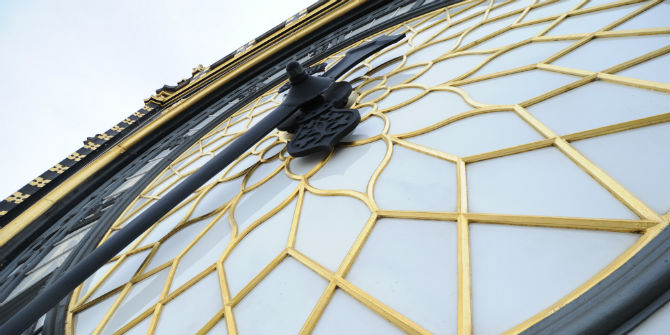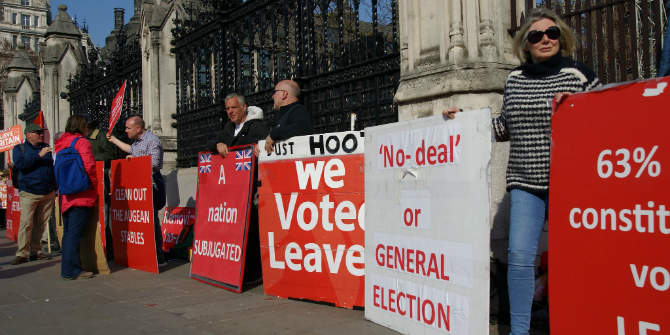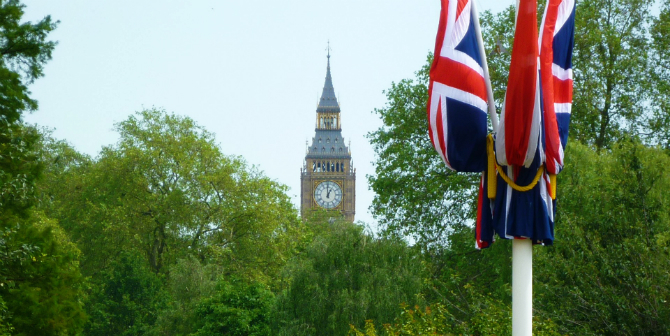 The Prime Minister has requested and received consent for the current parliament to be prorogued, and plans to introduce a new Queen’s Speech before the Brexit deadline of 31 October. David Howarth (University of Cambridge) assesses the options available for those wishing to oppose this and enable the Commons to prevent a no-deal Brexit.
The Prime Minister has requested and received consent for the current parliament to be prorogued, and plans to introduce a new Queen’s Speech before the Brexit deadline of 31 October. David Howarth (University of Cambridge) assesses the options available for those wishing to oppose this and enable the Commons to prevent a no-deal Brexit.
Boris Johnson’s plan to advise the Queen to prorogue Parliament, from 9 September to 14 October, has several advantages for him in addition to the obvious one that it would close Parliament down during a period in which otherwise it might legislate against a no deal Brexit or vote for a motion of no confidence. It means that the House of Commons will not need to vote on a sittings motion to go into recess for the party conferences, robbing opponents of a no deal Brexit of one of their opportunities to seize control of the Commons’ agenda. And it means that, because a new session of parliament would begin, he could put to the Commons a Brexit deal so close to Theresa May’s deal that the Speaker would otherwise rule it out as asking the House to vote on the same matter twice. As a result, his opponents might turn out to include not only the remain parties and anti-no dealers, but also pro-no deal anti-dealers.

So, apart from legal action (whose chances of success, while not zero, are low), what options are now available to his opponents?
1. A motion of no confidence
Time still remains, before 9 September, for the Commons to bring the government down and replace it with another government. Johnson’s spokespeople have repeated their threat that if the Commons passed a motion of no confidence, the government would not resign but would sit tight for the statutory fourteen days, precipitating a general election which Johnson, using a power created in s. 2(7) of the Fixed-term Parliaments Act 2011, would set for after Brexit day.
Johnson’s plan works unless the opposition can put together a majority for a new emergency government. The problem, illustrated over the summer, is that Jeremy Corbyn (whose commitment to stopping a chaotic Brexit precipitated by the Conservatives is not universally accepted) will not support any candidate for the job of emergency Prime Minister other than himself but the Conservative MPs who might otherwise vote for an emergency government would not support Corbyn. Something has to give for this route to work.
Even if it did work, a further problem might be that Johnson would refuse to resign anyway. He would come under pressure from the Cabinet Secretary and the Queen’s Private Secretary to do the right thing and not embarrass the Queen, but it is far from clear that Johnson would succumb. At that point, the Queen might exercise her undoubted legal power to dismiss him. But she might be unwilling to do that without further political cover. That could come in the form of a resolution of the House of Commons confirming that not only did the House have no confidence in Johnson, but also it did have confidence in a specified alternate Prime Minister.
Given that the Speaker of the House, John Bercow, has described Johnson’s plan as ‘a constitutional outrage’, the normal problem for an opposition that the government controls the agenda of the House might well fade away. The Speaker has two important powers that undermine the government’s control of the agenda: to allow emergency debates under SO 24 (newly reinterpreted as allowing amendments as long as the text of the motion is not ‘neutral’) and motions about parliamentary privilege, which includes motions about contempt of parliament. Either of these could be used to allow the House to debate relevant motions.
Other options to force Johnson out include two moves from the last era (more than two centuries ago) in which ministers claimed that they did not need the confidence of the House of Commons to govern: (1) emergency legislation simply declaring Johnson no longer to be Prime Minister and making it a criminal offence for him to purport to exercise the powers of the office, the modern equivalent of an Act of Attainder; and, (2) impeachment, last used in the early 19th century but never formally abolished, although unless the House of Lords acted with unusual haste, it might be too slow for use in the current crisis. The charge would be misconduct in public office.
2. Legislation
Opponents of the government already seemed to be planning to seize control of the order paper and pass legislation designed to stop a no deal Brexit. If enough time exists to pass a Bill before prorogation starts, another way to stop the prorogation would be to add a clause to the Bill making it unlawful for ministers to advise the Queen to prorogue unless the Commons had voted for it and requiring the Prime Minister to advise the Queen, under the terms of the Meeting of Parliament Act 1797, to ask parliament to sit regardless of the order to prorogue.
The government possibly believes that the opposition would be stymied by a rule that says that Bills affecting the royal prerogative cannot pass unless the Queen has given consent, and the government controls whether the Queen is asked for her consent. But many ways exist of getting around that rule. For one thing, the government has accepted that the rule is purely one of House of Commons procedure and so the Speaker decides whether it applies.
3. Contempt
Another possibility is for the Commons to find Johnson in contempt of the House. Erskine May, the bible of parliamentary procedure, says that contempt includes ‘any act or omission which obstructs or impedes either House of Parliament in the performance of its functions’. The 14 October date seems to have been chosen to prevent questioning of the government, and possible motions of no confidence and emergency legislation, before the next European Council, and to make it easier to run down the clock after that date. Arguably, therefore, Johnson has committed contempt.
Contempt motions are not subject to the government’s control of the order paper. They are debated at the discretion of the Speaker.
If Johnson is found in contempt, what then? What if he refuses to purge his contempt by reversing the prorogation? Sanctions for contempt against people who are not MPs seem weak, as the case of Dominic Cummings shows. But against MPs, the position is quite different. Ultimately, the House can expel any member of parliament by resolution, as it did, for example in 1954. As a non-member, it would be very difficult for Johnson to carry on as Prime Minister. Even if he declared his intention to stand in a by-election, the House could resolve that it would expel him again (or it could even refuse to hold the by-election).
4. Humble Address
A final possibility would be for the House, having seized control of the agenda, to ask the Queen not to listen to Johnson and not to prorogue Parliament. The Commons could do this using the established mechanism of a ‘Humble Address’, motion to send the Queen a polite message.
From the point of view of the Queen’s advisers, this would be the ultimate nightmare, because it would raise the prospect of placing the Queen at the centre of politics, the last place they want her to be. But, before the Queen needed to make a decision, such a motion would undoubtedly establish, without risking a general election, that Johnson lacked the confidence of the House. The right to give advice to the Queen on constitutional matters is one of the central privileges of the Prime Minister, and for the House to resolve that Johnson cannot be trusted to exercise it would amount to the clearest possible decision that he lacked their confidence. If Johnson were a man of honour, he would, to avoid causing the Queen embarrassment, immediately resign.
On the assumption, however, that Johnson is not a man of honour, the Humble Address would at least provide even clearer grounds than already exist for bringing a contempt motion.
This post represents the views of the author and not those of the Brexit blog, nor LSE. It first appeared at Democratic Audit.
David Howarth is Professor of Law and Public Policy, University of Cambridge.







Those thinking the Queen might or should intervene should be aware of one precedent which I’m sure is very much on the minds of her advisors, the Kerr sackings in Australia. ( https://en.wikipedia.org/wiki/1975_Australian_constitutional_crisis ) This was when the Governor-General (who as the Queen’s representative has considerable reserve powers under the Australian constitution) dismissed an unpopular Prime Minister (Gough Whitlam) who had lost the ability to govern. I think the Kerr sackings are now widely seen in Australia as having been unwise and have often been criticised by Australian republicans. (Any Australian readers of LSE Brexit want to comment on that?) The Queen will not want to make a similar mistake, so I think it is extremely unlikely that she will take any action which will endanger her politically, such as dismissing Boris Johnson.
To me that leaves as the most plausible hope of the Remainers the idea that they can get legislation passed. On the basis of my cursory reading of the interesting Instute for Government report https://www.instituteforgovernment.org.uk/sites/default/files/publications/parliament-role-before-31-october-brexit-FINAL_0.pdf , it looks like their best bet is to get John Bercow to agree to use a Standing Order 24 debate which would allow the House of Commons to get parliamentary time. So the most important person in this is not the Queen but John Bercow.
The key point is that at the moment Johnson has only a majority of one MP. He relies on the votes of 10 extreme right wing Ulster DUP MPs. He has also lost the support of Ruth Davidson, who helped elect 13 Conservative Scots MPs at the last election.
By all measures, the Queen should be extremely wary of endorsing any proposal put forward by Boris Johnson at the current moment. The speedy agreement to the prorogation of Parliament may in hindsight be seen as extremely unwise, especially in an era of constitutional crisis over Brexit. It is Parliament, not the Executive, which is supreme in the British constitution. It is fully within it’s rights to seek for some way to seek a “row back” on the current situation.
Bad advice, even by Etonian educated politicians, is still bad advice.
@Frederick: “It is Parliament, not the Executive, which is supreme in the British constitution.” Chop that traitor’s head off! Sovereignty lies with the Sovereign, as you might expect. However Parliament has to agree to legislation and of course is also responsible for voting for Prime Ministers. I think the traditional way of saying this is that sovereignty lies with the Crown in Parliament.
It is absolutely not the job of the Queen to endorse, or not, the wisdom of the Prime Minister. I think she had no choice but to do what she did.
I cannot agree with this counter-argument.
The UK constitution is a unique balance of written,rules, unwritten rules, and, most importantly, adaptation to the changing environment in which it operates. The Queen herself, with her vast experience of the work of the Commonwealth, should be well aware of this.
Obviously she is constrained to act on her Prime Minister’s advice. However she must also be aware of the degree of support the PM has in the House of Commons. She must also be extremely wary if any major constitutional change is being advocated. Normally the PM him/herself would take account of this in his/her advice to the Queen.
However, Johnson has blithely ignored this. He only has a working majority of one in the House of Commons, the smallest possible. He is pushing ahead with not just Brexit, but a no deal Brexit. The vote in favour in the Brexit poll was only 52% to 48%, and was Remain in Scotland, Northern Ireland, Greater London, and Gibraltar.
If Johnson wants a no deal Brexit, he should first get a mandate in a General Election. I am sure Johnson is well aware of this. He is simply trying to make it seem that Parliament and the (non Etonian) metropolitan elite is frustrating him, before going to the country.